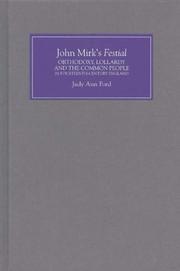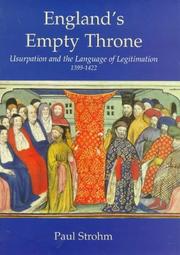| Listing 1 - 10 of 23 | << page >> |
Sort by
|
Book
ISBN: 1139163515 1108043054 Year: 1860 Publisher: Place of publication not identified : Cambridge : publisher not identified, Cambridge University Press
Abstract | Keywords | Export | Availability | Bookmark
 Loading...
Loading...Choose an application
- Reference Manager
- EndNote
- RefWorks (Direct export to RefWorks)
This two-volume work, published in the Rolls Series in 1860, is valuable for both religious and linguistic history. A vernacular text written in a period of division within the Church and widespread popular religious discontent, it provides a record of the arguments that fuelled this division. Reginald Pecock (c.1392-c.1459) recounts the attacks made by Lollard reformers and provides well-composed answers to them. A firm believer in papal supremacy, Pecock insisted on proving doctrine by reason, a position which laid him open to the charges of heresy that dogged his career and eventually led to his disgrace. Volume 2 deals with ranks and degrees of clergy, papal statutes and authority, and religious orders. It also contains related contemporary texts in Latin both attacking and vindicating Pecock and his position. These include John Bury's answer to The Repressor, Gladius Salomonis, and a report of Pecock's eventual downfall and abjuration.
Lollards --- Great Britain --- Religion
Book
ISBN: 1139163507 1108043046 Year: 1860 Publisher: Place of publication not identified : Cambridge : publisher not identified, Cambridge University Press
Abstract | Keywords | Export | Availability | Bookmark
 Loading...
Loading...Choose an application
- Reference Manager
- EndNote
- RefWorks (Direct export to RefWorks)
This two-volume work is valuable for both religious and linguistic history. A vernacular text written in a period of division within the Church and widespread popular religious discontent, it provides a record of the arguments that fuelled this division. Reginald Pecock (c.1392-c.1459) recounts the attacks made by Lollard reformers and provides well-composed answers to them. A firm believer in papal supremacy, Pecock insisted on proving doctrine by reason, a position which laid him open to the charges of heresy that dogged his career and eventually led to his disgrace. Editor Charles Babington's introduction to this edition, published in the Rolls Series in 1860, gives biographical and contextual information, and a summary of the works contained within both volumes. In Volume 1, Pecock outlines eleven points of attack and his general answer to them, specifically dealing with vindications of images and pilgrimages, and the revenues of the clergy.
Lollards --- Great Britain --- Religion
Book
Year: 1858 Publisher: London : Longman, Brown, Green, Longmans, and Roberts,
Abstract | Keywords | Export | Availability | Bookmark
 Loading...
Loading...Choose an application
- Reference Manager
- EndNote
- RefWorks (Direct export to RefWorks)
Lollards --- Wycliffe, John, --- Wycliffe, John
Book
Year: 1988 Publisher: Oxford [etc.] : Oxford University Press,
Abstract | Keywords | Export | Availability | Bookmark
 Loading...
Loading...Choose an application
- Reference Manager
- EndNote
- RefWorks (Direct export to RefWorks)
LOLLARDS --- WYCLIFFE (JOHN), d. 1384 --- BIBLE --- TRANSLATION --- LOLLARDS --- WYCLIFFE (JOHN), d. 1384 --- BIBLE --- TRANSLATION

ISBN: 1282079999 9786612079993 1846154804 1843840014 Year: 2006 Publisher: Cambridge : D.S. Brewer,
Abstract | Keywords | Export | Availability | Bookmark
 Loading...
Loading...Choose an application
- Reference Manager
- EndNote
- RefWorks (Direct export to RefWorks)
'Marvellously perceptive and insightful'. FIONA SOMERSET, Duke University. Written with largely uneducated rural congregations in mind, John Mirk's Festial became the most popular vernacular sermon collection of late-medieval England, yet until relatively recently it has been neglected by scholars -- despite the fact that the question of popular access to the Bible, undoubtedly regarded as the preserve of learned culture, along with the related issue of the relative authority of written text and tradition, is at the heart of both late-medieval heresy and the resultant reformulation of orthodoxy. It offers, in fact, an unparalleled opportunity to analyze the religious ideology communicated by the orthodox church to the vast majority of people in fourteenth-century England: the ordinary country folk. This book represents the first major examination of the Festial, looking in particular at the issues of popular culture and piety; the oral tradition; biblical and secular authority; and clerical power.
JUDY ANN FORD is Associate Professor in the History Department of Texas A&M University-Commerce.
Sermons, Medieval --- Lollards. --- Poor priests --- Wiclifites --- Wyclifites --- Mirk, John, --- England --- Church history

ISBN: 0300075448 Year: 1998 Publisher: New Haven (Conn.) : Yale university press,
Abstract | Keywords | Export | Availability | Bookmark
 Loading...
Loading...Choose an application
- Reference Manager
- EndNote
- RefWorks (Direct export to RefWorks)
Lollards. --- GREAT BRITAIN --- RICHARD II, KING OF ENGLAND, 1367-1400 --- LOLLARDS --- HISTORY --- HOUSE OF LANCASTER, 1399-1461 --- HENRY IV, 1399-1413 --- HENRY V, 1413-1422 --- KINGS AND RULERS --- SUCCESSION

ISBN: 9781843840015 9781846154805 Year: 2006 Publisher: Cambridge D.S. Brewer
Abstract | Keywords | Export | Availability | Bookmark
 Loading...
Loading...Choose an application
- Reference Manager
- EndNote
- RefWorks (Direct export to RefWorks)
Written with largely uneducated rural congregations in mind, John Mirk's Festial became the most popular vernacular sermon collection of late-medieval England, yet it has been neglected by scholars - despite the fact that the question of popular access to the Bible, undoubtedly regarded as the preserve of learned culture, along with the related issue of the relative authority of written text and tradition, is at the heart of both late-medieval heresy and the resultant reformulation of orthodoxy. It offers, in fact, an unparalleled opportunity to analyze the religious ideology communicated by the orthodox church to the vast majority of people in fourteenth-century England: the ordinary country folk. This book offers the first major examination of the Festial, looking in particular at the issues of popular culture and piety; the oral tradition; biblical and secular authority; and clerical power.
Mirk, John. Festial --- Sermons anglais (moyen anglais) --- Lollards --- Angleterre (GB) --- Histoire et critique --- Histoire religieuse --- 1066-1500
Book
ISBN: 9782503583822 2503583830 2503583822 Year: 2021 Publisher: Turnhout: Brepols,
Abstract | Keywords | Export | Availability | Bookmark
 Loading...
Loading...Choose an application
- Reference Manager
- EndNote
- RefWorks (Direct export to RefWorks)
John Wyclif (d. 1384), famous Oxford philosopher-theologian and controversialist, was posthumously condemned as a heretic at the Council of Constance in 1415. Wyclif’s influence was pan-European and had a particular impact on Prague, where Jan Hus, from Charles University, was his avowed disciple and the leader of a dissident reformist movement. Hus, condemned to the stake at Constance, gathered around him a prolific circle of disciples who changed the landscape of late medieval religion and literature in Bohemia, just as Wyclif’s own followers had done in England.Both thinkers, and the movements associated with them, played a crucial role in the transformation of later medieval European thought, in particular through a radically enlarged role of textual production in the vernaculars (especially Middle English and Old Czech), as well as in Latin, in the philosophical, theological, and ecclesiological realms.This interdisciplinary volume of essays brings together cutting-edge research from scholars working in these and contiguous fields and asks fundamental questions about the methods that informed Wycliffite and Hussite writings and those by their interlocutors and opponents. Viewing these debates through a methodological lens enables a reassessment of the impact that they had, and the responses they elicited, across a range of European cultures, from England in the west via France and Austria to Bohemia in the east.
Hussites --- Lollards --- Theology --- History. --- Hus, Jan, --- Wycliffe, John, --- Wycliffe, John, ....?-1384 --- Hus, Jan, 1370-1415 --- Invloed --- Wycliffe, John --- Europe --- Church history.
Book
ISBN: 9780199589043 0199589046 0191594563 Year: 2011 Publisher: New York, N.Y. Oxford University Press
Abstract | Keywords | Export | Availability | Bookmark
 Loading...
Loading...Choose an application
- Reference Manager
- EndNote
- RefWorks (Direct export to RefWorks)
Lollards. --- Dissenters, Religious --- Lollards --- History --- England --- Angleterre --- Church history --- Histoire religieuse --- Christian dogmatics --- anno 1200-1499 --- Great Britain --- Dissenters, Religious - England - History - To 1500. --- England - Church history - 1066-1485. --- Hérésies chrétiennes --- Angleterre (GB) --- Moyen âge --- 1066-1500 --- Hérésies chrétiennes --- Moyen âge

ISBN: 0851159958 Year: 2003 Publisher: Woodbridge Boydell
Abstract | Keywords | Export | Availability | Bookmark
 Loading...
Loading...Choose an application
- Reference Manager
- EndNote
- RefWorks (Direct export to RefWorks)
Lollards --- Wycliffe, John, --- England --- Angleterre --- Church history --- Histoire religieuse --- 27 <420> "10/14" --- 284.3 --- 289.921 --- Poor priests --- Wiclifites --- Wyclifites --- Kerkgeschiedenis--Engeland--?"10/14" --- Hussieten. Hus. Wycliff. Taborieten. Calixtenen. Utramquisten. Horebieten --- Lollarden --- Wycliffe, John --- -27 <420> "10/14" --- 289.921 Lollarden --- 284.3 Hussieten. Hus. Wycliff. Taborieten. Calixtenen. Utramquisten. Horebieten --- Joannes Wyclif --- Joannis Wiclif --- -Lollards --- Vicliffe, John, --- Viklef, Jan, --- Viklef, John, --- Viklif, Jan, --- Wickliffe, John, --- Wiclif, Johann von, --- Wiclif, John, --- Wicliffe, John, --- Wyclif, John, --- Wyclyf, John, --- Wykliffe, Johannes von,
| Listing 1 - 10 of 23 | << page >> |
Sort by
|

 Search
Search Feedback
Feedback About UniCat
About UniCat  Help
Help News
News